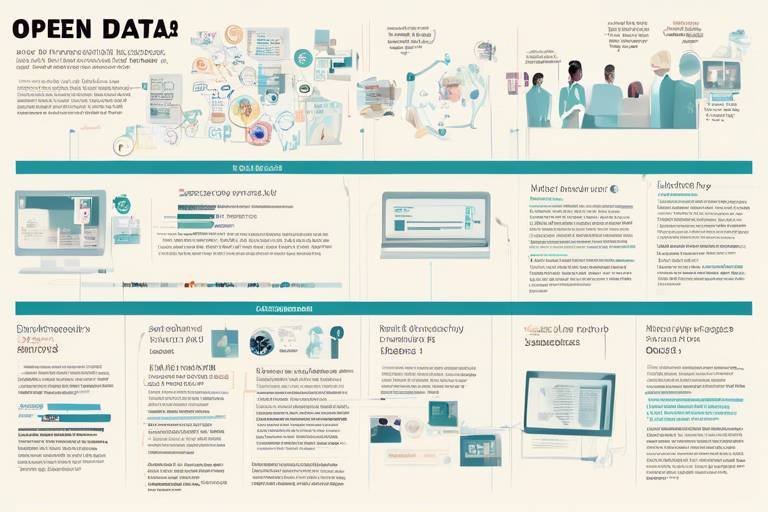The Role of Ethical Considerations in Genetic Research
In the rapidly advancing field of genetic research, ethical considerations play a pivotal role in shaping the landscape of scientific inquiry. The ability to manipulate genetic material, understand hereditary diseases, and explore new therapeutic avenues brings with it a host of ethical dilemmas that must be navigated with care. As we delve into this complex arena, we must ask ourselves: how do we balance the promise of groundbreaking discoveries with the rights and dignity of individuals? This article explores the importance of ethical considerations in genetic research, highlighting key topics such as consent, privacy, and the implications of genetic modifications on society and individuals.
Informed consent is the cornerstone of ethical research practices, particularly in genetic studies where the stakes can be incredibly high. It ensures that participants are fully aware of what their involvement entails and the potential consequences that may arise from it. Obtaining true informed consent is not merely a checkbox exercise; it involves a comprehensive understanding of the research objectives, risks, benefits, and the use of genetic data. Researchers must engage in open dialogues with participants, providing them with clear and accessible information. This process can be challenging, especially when dealing with complex genetic concepts that may be difficult for the average person to grasp. How do we ensure that participants genuinely understand what they are consenting to? This question underscores the need for continuous improvement in communication strategies within the realm of genetic research.
Privacy concerns are paramount in genetic research, as the data collected can reveal sensitive information about individuals and their families. Researchers have an ethical responsibility to safeguard participant data, ensuring that it is handled with the utmost care and confidentiality. The ethical implications of mishandling genetic information can be severe, potentially leading to discrimination or stigmatization of individuals based on their genetic predispositions. To navigate these challenges, researchers must implement robust data protection measures and adhere to ethical guidelines that prioritize participant privacy. This includes obtaining explicit consent for data use and ensuring that personal identifiers are removed or anonymized to protect participant identities.
Data anonymization techniques are essential for protecting participant identities while allowing researchers to glean valuable insights from genetic data. By removing or altering identifiable information, researchers can create datasets that maintain the integrity of the research without compromising individual privacy. Various methods, such as data masking and aggregation, can be employed to achieve this goal. However, it is crucial to strike a balance between anonymization and the utility of the data for scientific analysis. If data is overly anonymized, it may lose its relevance for research purposes, leading to a conundrum that researchers must navigate carefully.
Despite its importance, anonymization presents challenges that researchers must address. One significant concern is the potential for re-identification, where individuals can be linked back to their data through sophisticated data mining techniques or the availability of external datasets. Researchers must remain vigilant and adopt best practices to minimize these risks. Additionally, the evolving landscape of technology and data sharing complicates the ability to fully anonymize genetic data, raising questions about the long-term implications for participant privacy.
Legal frameworks governing data protection are vital in ensuring ethical practices in genetic research. Various laws and regulations, such as the General Data Protection Regulation (GDPR) in Europe and the Health Insurance Portability and Accountability Act (HIPAA) in the United States, set standards for how genetic data should be handled. These regulations are designed to protect individuals' rights and privacy while promoting transparency in research practices. Researchers must stay informed about these legal requirements to ensure compliance and uphold ethical standards in their work.
Gene editing technologies, such as CRISPR, have revolutionized the field of genetics, offering unprecedented opportunities for treating genetic disorders. However, these advancements also raise profound ethical questions. The ability to alter genetic material not only impacts the individual but may also have far-reaching consequences for future generations. What moral responsibilities do researchers have when it comes to editing the genetic makeup of organisms, including humans? This subsection delves into the moral implications of gene editing and the potential societal impacts that could arise from these technologies.
Equity is a significant concern in genetic research, as disparities in access to research benefits can perpetuate existing inequalities in healthcare. Ensuring diverse representation in genetic studies is crucial for producing findings that are applicable to all populations. Without equitable participation, the risk of bias in research outcomes increases, potentially leaving certain groups without access to life-saving therapies. Researchers must actively work towards inclusive practices that engage underrepresented communities in genetic research.
Access to genetic therapies can be unequal, often influenced by socioeconomic factors. While some individuals may benefit from cutting-edge treatments, others may face barriers to access due to cost, location, or lack of information. This subsection examines the disparities in availability and affordability of genetic treatments among various socioeconomic groups, emphasizing the need for policies that promote equitable access to these life-changing therapies.
Engaging communities in genetic research is essential for ethical practice. Researchers must foster trust between themselves and participants by involving community voices in research decisions. Strategies for community engagement may include public forums, educational workshops, and collaborative partnerships with local organizations. By prioritizing community input, researchers can ensure that their work aligns with the values and needs of the populations they aim to serve.
As genetic research evolves, new ethical challenges will undoubtedly arise. The rapid pace of technological advancement means that researchers must remain vigilant and proactive in addressing potential ethical dilemmas. Speculating on emerging issues, such as the implications of synthetic biology or the commercialization of genetic data, highlights the importance of continuous ethical considerations in future studies. Researchers must cultivate a culture of ethical awareness, ensuring that their work is guided by principles that prioritize human dignity and societal well-being.
- What is informed consent in genetic research? Informed consent is the process by which researchers ensure that participants understand the implications of their involvement in a study, including risks and benefits.
- Why is privacy important in genetic research? Privacy is crucial because genetic data can reveal sensitive information that may lead to discrimination or stigmatization if mishandled.
- What are the challenges of data anonymization? Challenges include the potential for re-identification and the loss of data utility if overly anonymized.
- How can researchers ensure equity in genetic research? Researchers can promote equity by ensuring diverse representation and addressing barriers to access for underrepresented populations.
- What future ethical challenges may arise in genetic research? Future challenges may include implications of synthetic biology, commercialization of genetic data, and maintaining ethical standards in rapidly advancing technologies.

Informed Consent
Informed consent is the cornerstone of ethical practice in genetic research, serving as a vital bridge between researchers and participants. It’s not just a form to sign; it’s about ensuring that individuals truly understand what they are getting into. Imagine being asked to dive into a deep ocean without knowing how deep it is or what lies beneath. That’s how crucial informed consent is in the realm of genetics. Participants should be fully aware of the implications, potential risks, and benefits of their involvement in research projects.
Obtaining informed consent can be a complex process. Researchers must navigate through various challenges, including the participants' comprehension of scientific terminology and the potential impact of the research findings on their lives. A well-structured informed consent process involves several key elements:
- Clear Information: Participants should receive straightforward information about the study's purpose, procedures, and duration.
- Risks and Benefits: It’s essential to outline any risks involved, as well as the potential benefits for the participants and society.
- Voluntary Participation: Participants must know that their involvement is entirely voluntary and that they can withdraw at any time without penalty.
- Confidentiality: Assurance that their data will be kept confidential and used solely for research purposes is crucial.
Moreover, researchers must be vigilant about ensuring that consent is not only informed but also ongoing. As studies progress, new information may emerge that could affect participants' willingness to continue. Therefore, it’s essential to maintain an open line of communication, allowing participants to ask questions and express concerns throughout the research process.
In some cases, obtaining informed consent can be particularly challenging. For instance, when working with vulnerable populations, such as children or individuals with cognitive impairments, researchers must take extra steps to ensure that consent is valid and ethically sound. This may involve seeking consent from guardians or using simplified language to explain the research.
Ultimately, informed consent is about respect and transparency. It empowers participants by giving them the knowledge they need to make informed decisions about their involvement in genetic research. As we continue to explore the complexities of genetics, embracing ethical practices like informed consent will foster trust and collaboration between researchers and the communities they serve.
- What is informed consent?
Informed consent is the process of providing potential research participants with comprehensive information about a study, allowing them to make an educated decision about their participation. - Why is informed consent important in genetic research?
It ensures that participants understand the implications of their involvement, which is crucial for ethical research practices. - How can researchers ensure informed consent?
Researchers can ensure informed consent by providing clear information, allowing for questions, and ensuring participants feel comfortable with their decision to participate.

Privacy and Data Protection
When it comes to genetic research, privacy is not just a buzzword; it's a fundamental right that every participant deserves. Imagine sharing the most intimate details of your genetic makeup, only to find out that your information could be misused. This fear is not unfounded. Genetic data is incredibly sensitive, and its potential misuse can lead to discrimination, stigmatization, and even psychological harm. Therefore, researchers must take robust measures to ensure the privacy and protection of participants' data.
One of the key challenges in genetic research is balancing the need for data accessibility with the imperative of data confidentiality. Researchers often require access to large datasets to draw meaningful conclusions, but they must tread carefully. The ethical responsibility lies in safeguarding participant identities while still allowing for scientific inquiry. This is where the importance of data anonymization comes into play.
Data anonymization techniques are essential for protecting participant identities. These methods serve to strip personal identifiers from genetic data, making it challenging to trace back to individual participants. Some common techniques include:
- Aggregation: Combining data from multiple individuals to prevent identification.
- Pseudonymization: Replacing private identifiers with fake identifiers or codes.
- Data Masking: Altering data to hide specific details while retaining its analytical value.
While these techniques provide a layer of protection, they are not foolproof. Researchers must remain vigilant about the potential risks associated with data anonymization.
Despite its importance, anonymization presents significant challenges. For instance, as technology advances, the ability to re-identify anonymized data increases. Data breaches can occur, exposing sensitive information even if it has been anonymized. Moreover, the context in which data is used can sometimes make it possible to infer identities, especially when combined with other datasets. This creates a complex dilemma: how can researchers ensure that their data is both useful for scientific analysis and secure from potential misuse?
Legal frameworks governing data protection are vital in addressing these challenges. Various laws and regulations, such as the General Data Protection Regulation (GDPR) in Europe and the Health Insurance Portability and Accountability Act (HIPAA) in the United States, set stringent guidelines on how genetic data should be handled. These regulations mandate that researchers obtain explicit consent from participants, clearly outline how their data will be used, and ensure that adequate security measures are in place to protect sensitive information. Understanding and adhering to these legal requirements is crucial for maintaining ethical standards in genetic research.
In conclusion, while the potential benefits of genetic research are immense, the ethical considerations surrounding privacy and data protection cannot be overlooked. Researchers must navigate this landscape carefully, ensuring that they prioritize the rights and well-being of participants. As we continue to explore the frontiers of genetics, the commitment to ethical practices will be the cornerstone of responsible research.
- What is the importance of privacy in genetic research? Privacy is essential to protect participants from potential misuse of their sensitive genetic information.
- How is data anonymization achieved? Data anonymization can be achieved through techniques like aggregation, pseudonymization, and data masking.
- What legal protections exist for genetic data? Laws like GDPR and HIPAA provide guidelines on how genetic data should be handled, ensuring participants' rights are respected.
- What are the risks associated with data anonymization? Advances in technology can sometimes allow for the re-identification of anonymized data, posing risks to participant privacy.

Data Anonymization
Data anonymization is a crucial aspect of genetic research, serving as a protective barrier for participant identities while still allowing researchers to glean valuable insights from the data collected. The process involves removing or altering personal identifiers from genetic information, ensuring that individual participants cannot be easily traced back from the data. This is particularly important in the realm of genetics, where sensitive information about a person's health, family history, and potential future risks can be revealed. The ethical responsibility researchers hold in safeguarding this information cannot be overstated, as breaches of privacy can lead to significant emotional and social repercussions for individuals involved.
One of the primary methods of data anonymization is through the use of pseudonymization, where identifying information is replaced with artificial identifiers. This allows researchers to analyze the data without exposing the individuals' identities directly. However, it’s essential to recognize that pseudonymization is not foolproof; with enough effort, someone might still be able to re-identify individuals. Therefore, researchers must adopt multiple layers of protection to enhance data security.
Another effective technique involves data aggregation, where individual data points are combined to present a broader picture rather than focusing on specific cases. For instance, instead of reporting genetic findings from a single participant, researchers might present trends observed in a larger group. This method not only protects individual privacy but also provides a more comprehensive understanding of genetic patterns.
Despite the advantages of data anonymization, challenges persist. Researchers must navigate the fine line between creating usable data sets for scientific inquiry and maintaining participant anonymity. Factors such as the size of the dataset, the uniqueness of the genetic information, and the potential for data linkage can complicate the anonymization process. For example, in a small study, even anonymized data might be vulnerable to re-identification if participants have unique genetic markers that can be traced back to them.
Furthermore, legal frameworks governing data protection, such as the General Data Protection Regulation (GDPR) in Europe, impose strict guidelines on how personal data should be handled. These regulations emphasize the necessity of anonymization techniques, making it imperative for researchers to stay informed about compliance requirements. A failure to adhere to these regulations can lead to severe penalties and loss of public trust.
In summary, while data anonymization is a vital tool for protecting participant identities in genetic research, it comes with its own set of challenges. Researchers must be diligent in applying robust anonymization techniques, understanding the legal landscape, and continually assessing the risks involved. Only then can they ensure that the pursuit of scientific knowledge does not come at the expense of individual privacy.
- What is data anonymization? Data anonymization is the process of removing or altering personal identifiers from data sets to protect individual identities while allowing for analysis.
- Why is data anonymization important in genetic research? It is crucial to protect sensitive genetic information from being linked back to individuals, which could lead to privacy violations and emotional distress.
- What are some common methods of data anonymization? Common methods include pseudonymization, data aggregation, and the use of statistical techniques to obscure individual data points.
- What legal regulations govern data anonymization? Regulations such as the GDPR in Europe set strict guidelines for how personal data, including genetic information, must be handled and protected.

Challenges in Anonymization
Anonymization is a crucial aspect of genetic research, yet it is fraught with various challenges that researchers must navigate. One of the primary challenges is the **risk of re-identification**. Even when data is stripped of personal identifiers, the potential for someone to piece together information from different datasets remains a significant concern. For instance, if a researcher combines anonymized genetic data with publicly available information, they might inadvertently reveal the identity of a participant. This risk is particularly pronounced in small populations where unique genetic markers can be easily traced back to individuals.
Another challenge is the **balance between data utility and privacy**. Researchers must ensure that the data remains useful for scientific analysis while simultaneously protecting the identities of the participants. This often leads to a dilemma: the more anonymization techniques are applied, the less nuanced and informative the data becomes. For example, while generalizing data points can protect individual identities, it may also obscure critical insights that could advance scientific knowledge. Thus, finding that sweet spot where data is both anonymized and valuable poses a significant hurdle.
Moreover, the **dynamic nature of technology** adds another layer of complexity. As new methods for data analysis and re-identification emerge, previously anonymized datasets might become vulnerable. What was considered secure yesterday may not hold the same status today. This rapid evolution necessitates ongoing vigilance and adaptation from researchers, who must continuously update their anonymization strategies to stay ahead of potential threats.
Additionally, ethical considerations play a role in the challenges of anonymization. Researchers must grapple with the question of whether it is ethically acceptable to use anonymized data for purposes beyond the original intent of the study. For instance, if genetic data is collected for research on a specific disease, can it ethically be used in other studies without the participants' consent? This ethical gray area complicates the landscape of anonymization and requires careful consideration.
In summary, while anonymization is a vital tool for protecting participant privacy in genetic research, it is not without its challenges. Researchers must navigate the risks of re-identification, balance data utility with privacy, adapt to evolving technologies, and address ethical concerns. These challenges underscore the importance of developing robust anonymization protocols and fostering a culture of transparency and responsibility in genetic research.
- What is data anonymization?
Data anonymization is the process of removing personally identifiable information from data sets, making it impossible to identify individuals from the data.
- Why is anonymization important in genetic research?
Anonymization is crucial in genetic research to protect the privacy of participants and to comply with ethical and legal standards regarding data protection.
- What are the risks associated with anonymized data?
Risks include the potential for re-identification of individuals, loss of data utility, and ethical dilemmas regarding the use of data for purposes beyond the original study.
- How can researchers mitigate the challenges of anonymization?
Researchers can mitigate these challenges by implementing robust anonymization techniques, staying updated on technological advancements, and fostering ethical practices within their studies.

Legal Regulations
The landscape of genetic research is not just shaped by scientific innovation but is also significantly influenced by a complex web of . These laws are designed to protect individual rights and ensure ethical practices in research. As genetic technologies advance, navigating these regulations becomes increasingly crucial for researchers. In many countries, legal frameworks like the Health Insurance Portability and Accountability Act (HIPAA) in the United States and the General Data Protection Regulation (GDPR) in Europe set stringent guidelines for the handling of genetic data.
One of the primary objectives of these regulations is to safeguard participants' privacy. Researchers must ensure that any genetic information collected is done so with the utmost care, maintaining confidentiality and integrity. For instance, under the GDPR, individuals have the right to access their data, request corrections, and even demand deletion. This empowers participants and fosters a sense of control over their genetic information, which is particularly important given the sensitive nature of this data.
Moreover, legal regulations often require researchers to obtain informed consent from participants. This means that individuals must not only agree to participate but also fully understand what their participation entails, including how their genetic data will be used, shared, and stored. This process can be challenging, as it requires researchers to communicate complex scientific concepts in a way that is accessible and comprehensible to all participants.
Additionally, the legal landscape is constantly evolving. As new technologies emerge, laws must adapt to address the unique challenges they present. For example, the rise of gene editing tools like CRISPR has prompted lawmakers to consider regulations that specifically govern the use of these technologies. This includes discussions about the ethical implications of gene editing in humans and the potential long-term consequences for society. Researchers must stay informed about these changes to ensure compliance and to uphold ethical standards in their work.
In summary, legal regulations play a pivotal role in guiding genetic research. They not only protect participants but also help maintain the integrity of the research process. As we continue to explore the fascinating world of genetics, it is essential for researchers to navigate this regulatory landscape thoughtfully and responsibly.
- What are the main legal regulations governing genetic research?
Legal regulations vary by country but commonly include HIPAA in the U.S. and GDPR in Europe, which focus on data protection and privacy. - How does informed consent work in genetic research?
Informed consent requires researchers to provide clear information about the study, ensuring participants understand how their data will be used before agreeing to participate. - What are the implications of gene editing regulations?
Gene editing regulations address the ethical concerns surrounding the alteration of genetic material, particularly in humans, and aim to prevent potential misuse of these technologies.

Ethical Implications of Gene Editing
Gene editing technologies, particularly CRISPR, have revolutionized the landscape of genetic research, but they also raise profound ethical questions that society cannot ignore. Imagine wielding a pair of molecular scissors that can cut and paste DNA sequences with precision; it sounds like science fiction, yet it’s a reality today. As we stand on the brink of this genetic frontier, we must grapple with the moral implications of our newfound abilities.
One of the most pressing ethical concerns revolves around the potential for designer babies. With the ability to enhance traits such as intelligence, physical appearance, or even disease resistance, the line between treatment and enhancement blurs. This leads us to ponder: Should we have the right to choose our children's genetic traits? While the prospect of eradicating genetic diseases is undeniably appealing, the idea of selecting traits raises questions about equality and fairness. If only the affluent can access such technologies, we risk creating a society divided by genetic privilege.
Moreover, there is the issue of unintended consequences. Altering an organism's genetic makeup could have ripple effects that we cannot fully predict. For instance, what if a gene we edit has unforeseen effects on other traits? This scenario is akin to playing a game of Jenga; removing one block can lead to the collapse of the entire structure. The ethical responsibility to ensure that gene editing does not lead to harm is paramount.
Additionally, we must consider the impact on future generations. When we edit the germline, the changes are passed down, creating a legacy of genetic modifications. This brings forth the question: Are we playing God? The implications of our actions today could echo through generations, affecting not only individuals but also entire populations. How do we ensure that these changes benefit humanity as a whole, rather than just a select few?
In light of these concerns, it is crucial for researchers, ethicists, and policymakers to engage in ongoing dialogue about the ethical frameworks that should guide gene editing practices. Establishing regulations that prioritize transparency, accountability, and public engagement will be essential in navigating this complex terrain. Society must be involved in discussions about the direction of genetic research, ensuring that diverse perspectives are considered.
In conclusion, while gene editing holds incredible potential for advancing medicine and improving human health, it also presents significant ethical dilemmas that cannot be overlooked. As we move forward, it is essential to balance innovation with caution, ensuring that our quest for knowledge does not outpace our ethical considerations.
- What is gene editing? Gene editing is a method used to alter the DNA of an organism, enabling scientists to modify genes with precision.
- What are the ethical concerns surrounding gene editing? Ethical concerns include the potential for designer babies, unintended consequences, and the impact on future generations.
- How can society ensure ethical gene editing practices? By engaging in dialogue, establishing regulations, and involving diverse perspectives in decision-making processes.
- What is CRISPR? CRISPR is a revolutionary gene-editing technology that allows for precise alterations in DNA sequences.

Equity in Genetic Research
When we dive into the world of genetic research, one of the most pressing issues that surface is the concept of equity. It’s not just about who gets to participate in these groundbreaking studies; it’s also about who gets to benefit from the discoveries that arise. Imagine a world where only a select few have access to the latest genetic therapies while others are left in the dark. This scenario is not just a possibility; it’s a reality that many face today. The disparities in genetic research participation and access to therapies highlight the urgent need for equitable practices.
Equity in genetic research is crucial because it ensures that diverse populations are not only represented in studies but also have access to the benefits derived from those studies. Historically, certain groups have been underrepresented in genetic research, leading to a lack of understanding of how genetic therapies might affect different demographics. For instance, if a study primarily involves individuals from a single ethnic background, the findings may not be applicable to others, potentially leaving significant gaps in treatment effectiveness across populations.
Furthermore, the access to genetic therapies can be alarmingly unequal. Consider the following factors that contribute to this disparity:
- Socioeconomic Status: Individuals from lower socioeconomic backgrounds often find themselves at a disadvantage when it comes to accessing cutting-edge genetic treatments.
- Geographic Location: Those living in rural areas may have limited access to specialized medical facilities that offer genetic therapies.
- Health Insurance Coverage: Not all insurance plans cover genetic testing or therapies, creating a barrier for many.
To combat these inequities, researchers and institutions must prioritize community engagement. Engaging with communities can foster trust and ensure that the voices of diverse populations are heard. This can be achieved through:
- Collaborative research initiatives that involve community leaders and members in the planning stages.
- Educational programs that raise awareness about the importance of genetic research and its benefits.
- Feedback mechanisms that allow communities to express their needs and concerns regarding genetic research.
By actively involving communities in the research process, we not only enhance the relevance of the studies but also pave the way for more equitable access to genetic therapies. This is especially important as we move towards a future where genetic modifications and therapies become increasingly common. The voices of all populations must be included in the dialogue to ensure that advancements in genetic research benefit everyone, not just a privileged few.
In conclusion, equity in genetic research is not just a buzzword; it’s a fundamental principle that must guide our approach to scientific inquiry and healthcare. By addressing disparities in representation and access, we can create a more inclusive and just landscape for genetic research, ultimately leading to better health outcomes for all.
Q: Why is equity important in genetic research?
A: Equity ensures that all populations are represented in research and have access to the benefits of genetic advancements, preventing disparities in healthcare.
Q: How can researchers promote equity in genetic studies?
A: Researchers can promote equity by engaging with diverse communities, ensuring inclusive representation, and addressing barriers to access for underrepresented groups.
Q: What are some challenges to achieving equity in genetic research?
A: Challenges include socioeconomic disparities, geographic limitations, and variations in health insurance coverage that can restrict access to genetic therapies.

Access to Genetic Therapies
Access to genetic therapies is a critical topic that stirs both hope and concern in the realm of healthcare. Imagine a world where life-saving treatments are available to everyone, regardless of their socioeconomic status. Unfortunately, this is far from reality. Many individuals find themselves grappling with the harsh truth that while genetic therapies hold incredible promise, not everyone can access them. This disparity raises significant ethical questions about equity and fairness in medical research and treatment.
One of the primary factors contributing to unequal access is the cost associated with genetic therapies. These treatments often come with a hefty price tag, making them prohibitively expensive for many families. For instance, therapies like gene editing can cost hundreds of thousands of dollars, leading to a situation where only the wealthy can afford such innovations. This creates a stark contrast between those who can access cutting-edge treatments and those left behind, potentially widening the gap in health outcomes between different social classes.
Furthermore, geographic location plays a significant role in access to these therapies. In urban areas, advanced medical facilities may offer the latest genetic treatments, while rural communities often lack such resources. This disparity can lead to a situation where individuals in less populated regions face significant hurdles in obtaining necessary care. It’s not just about having the treatment available; it’s also about being able to reach it.
To address these challenges, several strategies can be implemented:
- Policy Advocacy: Engaging policymakers to create laws that promote equitable access to genetic therapies.
- Community Programs: Developing local initiatives that focus on education and awareness about available treatments.
- Insurance Reforms: Advocating for changes in insurance coverage to include genetic therapies, making them more affordable.
Moreover, the role of community engagement cannot be overstated. By actively involving communities in discussions about genetic research, researchers can better understand the needs and concerns of diverse populations. This engagement fosters trust and ensures that the benefits of genetic therapies are shared more equitably. When communities feel included in the research process, they are more likely to advocate for their needs, resulting in a more inclusive healthcare system.
In conclusion, while the advancements in genetic therapies are nothing short of revolutionary, the journey toward equitable access is fraught with challenges. Addressing these disparities requires a concerted effort from researchers, policymakers, and communities alike. Only by working together can we hope to ensure that the benefits of genetic research are available to all, regardless of their background or circumstances.
1. What are genetic therapies?
Genetic therapies are treatments that involve altering the genes inside a person's cells to treat or prevent disease. They can be used to address genetic disorders, certain cancers, and other diseases.
2. Why is access to genetic therapies unequal?
Access is often unequal due to high costs, geographic disparities, and lack of insurance coverage for these innovative treatments, making them less accessible to lower-income individuals and rural populations.
3. How can communities improve access to genetic therapies?
Communities can improve access by advocating for policy changes, developing local education programs about genetic therapies, and encouraging insurance reforms to cover these treatments.
4. What role do researchers play in ensuring equitable access?
Researchers can engage with communities to understand their needs, advocate for fair policies, and ensure that their studies include diverse populations to better represent all groups in society.

Community Engagement
Engaging communities in genetic research is not just a checkbox on a project plan; it’s a vital component that shapes the entire process. Imagine being part of a groundbreaking study that could alter the course of medicine, yet feeling like a mere spectator in your own story. This is the reality for many individuals when researchers fail to involve community voices in their work. To truly foster trust and enhance the ethical practice of genetic research, it’s essential to create pathways for community engagement. This means more than just informing the community about research; it involves actively listening to their concerns, understanding their values, and incorporating their feedback into the research design.
One effective strategy for community engagement is the establishment of community advisory boards (CABs). These boards consist of community members who provide insights and feedback throughout the research process. By doing so, researchers can ensure that the studies are culturally sensitive and relevant to the populations they aim to serve. This collaborative approach not only enhances the research's credibility but also empowers communities, making them feel valued and heard.
Moreover, researchers can host workshops and informational sessions to educate community members about genetic research and its implications. Such initiatives can demystify complex scientific concepts and address common misconceptions. For instance, discussions around gene editing technologies like CRISPR can help clarify the potential benefits and risks associated with these advancements. Additionally, providing a platform for open dialogue allows community members to voice their concerns and ask questions, which can lead to a more informed and engaged participant pool.
Another critical aspect of community engagement is ensuring that the benefits of genetic research are equitably distributed. This means actively working to include underrepresented populations in research studies and ensuring they have access to the resulting therapies and technologies. Without this focus, there’s a risk that advancements in genetic research could exacerbate existing health disparities, leaving marginalized communities behind. Researchers must strive to create inclusive environments where diverse populations feel comfortable participating and sharing their genetic information.
Ultimately, the goal of community engagement in genetic research is to build a collaborative relationship between researchers and the communities they serve. By prioritizing transparency, respect, and inclusivity, researchers can not only enhance the quality of their studies but also contribute to a more ethically sound framework for genetic research. This engagement is crucial as we move forward into an era where genetic advancements hold the potential to revolutionize healthcare. The voices of the community must be at the forefront of this journey, ensuring that the benefits of research are shared by all.
- What is community engagement in genetic research?
Community engagement refers to the process of involving community members in the planning, execution, and evaluation of genetic research to ensure their needs and concerns are addressed. - Why is community engagement important?
It fosters trust, enhances the relevance of research, and ensures that the benefits of genetic advancements are accessible to all populations, especially underrepresented groups. - How can researchers effectively engage communities?
Researchers can engage communities through workshops, community advisory boards, and open dialogue sessions that encourage feedback and participation. - What challenges might arise in community engagement?
Challenges include potential mistrust, cultural differences, and logistical issues in organizing community events.

Future Ethical Challenges
As we look ahead, the landscape of genetic research is poised for dramatic evolution. With advancements in technology, particularly in areas like gene editing and synthetic biology, the ethical challenges we face are becoming increasingly complex. Imagine a world where we can not only treat genetic disorders but also enhance human capabilities. Sounds exciting, right? But this also raises a plethora of ethical questions that we must address. What happens when we start to play God with our genetic makeup? Are we prepared for the societal implications of such profound changes?
One major challenge is the potential for designer babies. This concept, while alluring, opens up a Pandora's box of ethical dilemmas. Should we allow parents to choose traits for their children, such as intelligence, physical appearance, or even athletic ability? This raises concerns about equality and the potential for a new form of discrimination based on genetic traits. Will we create a society where only the wealthy can afford enhancements, leading to a greater divide between socioeconomic classes? The implications are staggering and require rigorous ethical scrutiny.
Furthermore, as genetic data becomes more accessible, the issue of data ownership and privacy will intensify. Who owns the genetic information once it has been sequenced? Is it the individual, the research institution, or the pharmaceutical company funding the research? The answers to these questions are not straightforward and demand clear regulations to protect individuals from potential misuse of their genetic information. The idea of genetic data being sold or used without consent is a nightmare scenario that we must work to prevent.
In addition, the rise of artificial intelligence in genetic research introduces another layer of ethical complexity. AI can analyze vast amounts of genetic data, identifying patterns and making predictions that were previously unimaginable. However, this technology also poses risks, such as bias in algorithms that could lead to unequal treatment of different populations. If the training data for these AIs is not diverse, the outcomes could reinforce existing health disparities. Therefore, ensuring that AI systems are fair and equitable will be a significant challenge for researchers moving forward.
Moreover, as we delve deeper into genetic modifications, we must also consider the long-term consequences of our actions. Gene editing technologies like CRISPR have the potential to eradicate hereditary diseases, but what about the unforeseen effects on the ecosystem or human evolution? Will we inadvertently create new health issues or disrupt natural genetic diversity? The long-term implications of our research must be a priority in ethical discussions.
To navigate these challenges, it is vital for researchers, ethicists, and policymakers to engage in ongoing dialogue. Establishing ethical frameworks that can adapt to the rapid changes in technology will be crucial. This means not only setting guidelines for current research but also anticipating future developments and their potential impacts on society. Community engagement will also play a pivotal role; involving diverse voices in the conversation can help ensure that ethical considerations reflect the values and concerns of all stakeholders.
In conclusion, while the future of genetic research holds great promise, it also presents significant ethical challenges that we must confront head-on. By fostering a culture of ethical awareness and proactive engagement, we can harness the power of genetic research responsibly and equitably, paving the way for innovations that benefit all of humanity.
- What are designer babies? Designer babies refer to children whose genetic characteristics have been artificially selected or modified, often through gene editing technologies.
- Why is data privacy important in genetic research? Data privacy is crucial to protect individuals from potential misuse of their genetic information, which could lead to discrimination or exploitation.
- How can we ensure fairness in AI genetic research? Ensuring fairness involves using diverse training data and continuously monitoring algorithms for bias to prevent unequal treatment of different populations.
- What are the long-term consequences of gene editing? Long-term consequences may include unforeseen health issues, ecological impacts, and effects on human evolution that require thorough consideration before proceeding.
Frequently Asked Questions
- What is informed consent in genetic research?
Informed consent is a fundamental process that ensures research participants fully understand what their involvement entails. It involves providing clear information about the study's purpose, procedures, risks, and benefits, allowing individuals to make educated decisions about their participation.
- How is participant privacy protected in genetic studies?
Participant privacy is safeguarded through strict data protection measures, including anonymization techniques. Researchers are responsible for ensuring that sensitive genetic information is handled securely and that personal identifiers are removed to prevent unauthorized access and misuse of data.
- What are the challenges associated with data anonymization?
While anonymization is crucial for protecting identities, it poses challenges such as the risk of re-identification and the potential loss of data utility. Researchers must balance the need for anonymity with the necessity of retaining sufficient data for meaningful scientific analysis.
- What legal regulations govern genetic data protection?
Various laws and regulations, such as the GDPR in Europe and HIPAA in the United States, dictate how genetic data should be collected, stored, and shared. These frameworks aim to protect individuals' rights and ensure that their genetic information is treated with the utmost care.
- What ethical implications arise from gene editing technologies?
Gene editing technologies like CRISPR raise significant ethical questions regarding the potential for unintended consequences, the morality of altering human genetics, and the long-term impact on future generations. These implications necessitate careful consideration and dialogue among scientists, ethicists, and the public.
- How can equity be ensured in genetic research?
Ensuring equity in genetic research involves actively promoting diverse representation among study participants and addressing disparities in access to genetic therapies. Researchers must engage with underrepresented communities to build trust and ensure that the benefits of genetic advancements are shared fairly.
- What role does community engagement play in genetic research?
Community engagement is essential for ethical genetic research. By involving community voices in research decisions, scientists can foster trust, address concerns, and ensure that studies are conducted in a way that respects the values and needs of the populations involved.
- What future ethical challenges might arise in genetic research?
As genetic research continues to evolve, new ethical challenges will likely emerge, including issues related to gene patenting, the commercialization of genetic therapies, and the implications of synthetic biology. Researchers must remain vigilant and proactive in addressing these challenges to uphold ethical standards.



















